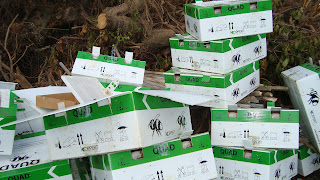Will I Ever Learn?
Probably not. I knew walking out to the hives I should grab my headgear. All I'm going to do, I thought, was pull out the frames the bees have cleaned off that I put in the empty super on top of the hives and put a little tray of honey in on top of the inner cover. It won't take long, and with the temps hovering around 50 the bees won't even bother to come out. I was fine with the first hive, #2, and even pulled out the entrance reducer and turned it to the smallest opening. Just fine. Then in the other hive, I was fine with pulling empty frames and putting in the honey. I put the cover back on top, and went to rotate the entrance reducer. That set them off. Immediately, one flew inside the hood of my sweatshirt and nailed me right behind my right ear. Others were coming after me, so I took off as quickly as my gimpy knee would allow, using my cap to swat away the most aggressive ones. I got on the other side of our prairie and finally lost them. I took off my jacket and removed the bee who had stung me, still crawling around in the hood. It smarted a bit, but not bad actually. I didn't even flick the stinger off until I was up by the house. It really didn't swell too much.
I knew from the past two autumns that they get pretty testy around this time. Last year I was lucky and had gloves on and only had to remove 3 stingers from the glove. I told myself then that I would always wear protection this time of year, even if I don't bother with smoke. I guess my deafness applies to hearing myself as well. Next year, I'll always be sure to wear headgear. I promise.
We just got back from visiting Jessica, Matt and Zinabu in upstate NY. While there, Jess took us out to some of the fields that Cornell U. owns. Jess is doing research on pumpkin pollination from various pollinators. Part of the research involved pollination with honey bees and some with bumble bees, as well as pollination by native bees and hand pollination. She has been busy the past week removing the bumble bee hives from the fields, some of which you see stacked above. We did see one solitary bumble bee, looking a bit stunned though it was a warm day, crawling on the boxes, but she said most were pretty empty by this time. The queens apparently have left the hives to mate and will overwinter in the ground, while the workers will die off. Their life cycle is certainly different from the honey bee, which is extraordinary in its social structure and development. Though the bumble bees are great pollinators, it's hard to beat the honey bee for interest.
I knew from the past two autumns that they get pretty testy around this time. Last year I was lucky and had gloves on and only had to remove 3 stingers from the glove. I told myself then that I would always wear protection this time of year, even if I don't bother with smoke. I guess my deafness applies to hearing myself as well. Next year, I'll always be sure to wear headgear. I promise.
We just got back from visiting Jessica, Matt and Zinabu in upstate NY. While there, Jess took us out to some of the fields that Cornell U. owns. Jess is doing research on pumpkin pollination from various pollinators. Part of the research involved pollination with honey bees and some with bumble bees, as well as pollination by native bees and hand pollination. She has been busy the past week removing the bumble bee hives from the fields, some of which you see stacked above. We did see one solitary bumble bee, looking a bit stunned though it was a warm day, crawling on the boxes, but she said most were pretty empty by this time. The queens apparently have left the hives to mate and will overwinter in the ground, while the workers will die off. Their life cycle is certainly different from the honey bee, which is extraordinary in its social structure and development. Though the bumble bees are great pollinators, it's hard to beat the honey bee for interest.



Comments
Post a Comment